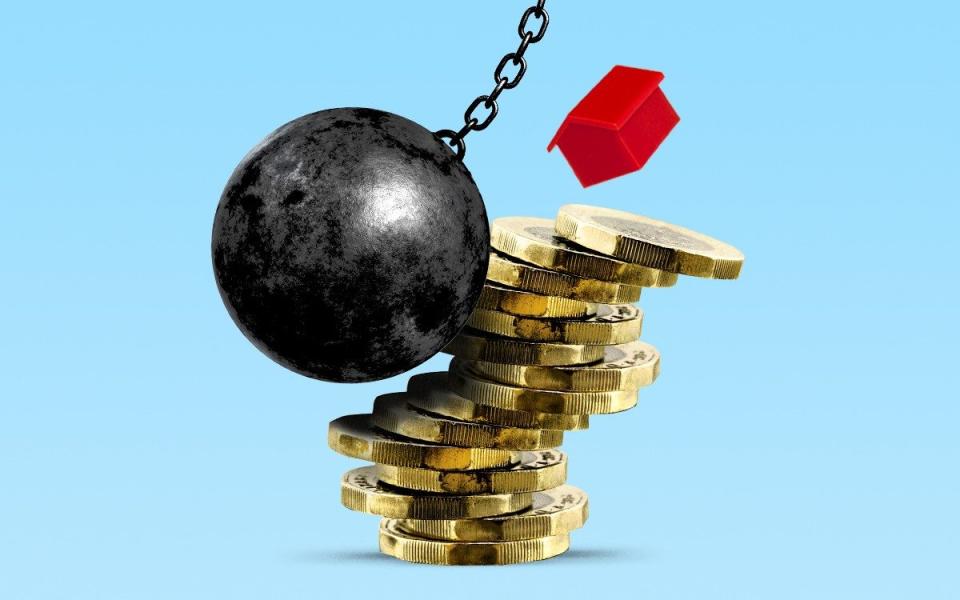Borrowers who snapped up dirt cheap pandemic deals now face £5,000-a-year mortgage shock

Homeowners who secured rock-bottom mortgage deals during the pandemic now face paying an extra £5,000 a year as rates surge again.
The average two-year fixed mortgage rate has now jumped to 5.72pc – the highest level since January, according to the analyst Moneyfacts.
Rates have risen from 5.33pc – an increase of 0.39 percentage points – after worse-than expected inflation data was released nearly two weeks ago.
It comes as homeowners are set to face an affordability crisis not seen since the 1990s, with repayments forecast to eat up around 51pc of incomes, according to analysis from Hamptons estate agents.
Thousands of homeowners will be hit with a huge jump in their bills after taking out cheap deals during the pandemic, when interest rates were at record lows of 0.1pc.
A stamp duty holiday in place from July 2020 to June 2021 also made it even easier to buy more expensive homes.
This year alone, around half a million homeowners are coming to the end of two-year fixes, according to banking body UK Finance. Across 2023 and 2024, around 3.4 million homeowners will come to the end of fixed-rate deals.
A homeowner with a £300,000 mortgage who secures the lowest rate today, at 3.76pc, will pay £1,544 a month in mortgage repayments, according to data from Moneyfacts and broker L&C Mortgages.
This represents a £415 a month – or £4,980 a year – increase when compared with the cheapest deal two years ago, which was 0.99pc.
Mortgage repayments would have been £1,129 a month at 0.99pc.
The total number of deals has also slumped from 5,295 to 4,686, with banks repricing rates to reflect market expectations that interest rates will hit 5.5pc by the end of the year to curb inflation.
Santander increased its mortgage rates by up to 0.43 percentage points on Monday, while Leeds’ and Halifax’s rates went up by up to 0.2 points and 0.3 points respectively.
TSB bumped up rates by up to 0.75 points on Friday, and Coventry Building Society is raising its two, three and five-year rates on Tuesday.
David Hollingworth, of broker L&C Mortgages, said he expected lenders to make “quite a lot of changes in the next week”.
He said: “In the near term I’d expect we’ll still see quite a bit of volatility among fixed rates and that we’ll see them nudge up just a bit further.”
Aaron Strutt, of broker Trinity Financial, said: “It’s a nightmare for a lot of borrowers.”
He said price gaps between major lenders are as big as one percentage point so he advised shopping around for the best deal.
Mr Strutt said banks do not have to give any notice to pull deals so he said it was key to act quickly to avoid missing out.
He added: “By taking too long to make a decision, it can cost you a small fortune.”
Five-year fixed mortgage rates remain cheaper than two-year fixes, so Mr Strutt said they could become more popular with borrowers.
The average five-year rate has increased from 5.01pc to 5.41pc since the inflation data was released.
First-time buyers are increasingly taking out longer mortgage terms to reduce their monthly repayments – with a record proportion of 19pc opting for 35 year mortgages, according to UK Finance.
The mortgage market crisis is worsening again following the ‘mini’ Budget last year, and experts reckon the pain soon to be felt will once again resemble that of 1990 – when interest rates were over 14pc.
House price growth has outstripped wage growth over the decades, which means the percentage of take-home pay being spent on mortgage repayments is rising.
Assuming incomes and house prices stay the same, Hamptons said if the Bank Rate rises to 5.5pc it is likely mortgage payments will eat up around 51pc to 52pc of the average single person’s post-tax salary.
Aneisha Beveridge, head of research at Hamptons, said this will put affordability back to where it was in December 1990, when the base rate was 14.6pc.
Typically, mortgage repayments make up 29pc of borrower’s take-home pay, according to Nationwide Building Society.
By the end of March, mortgage repayments as a percentage of take-home pay had already risen to levels not seen since the last financial crash.
The higher the Bank Rate goes, the higher mortgage rates are tipped to climb. This is because swap rates – a leading indicator for mortgage rates – are driven by what people think the Bank Rate will be over the next two or five years.

 Yahoo Finance
Yahoo Finance 